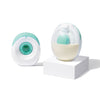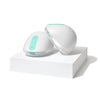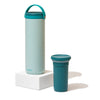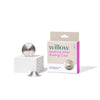It’s easy to associate acne with our awkward teenage years when the braces never seemed to come off and we grew too fast for our bodies. While teenage acne is fun and all, did you know babies can get acne too? In fact, it’s fairly common.
We know it’s concerning to see small whiteheads pop up on your little one’s cheeks, but often it passes within a matter of months and is not something to worry about. If you’re looking for an easy, cost effective at-home remedy for baby acne, breast milk might be the answer.
You heard us right! Breast milk has special antimicrobial properties that potentially eliminate inflammation and bacterial growth. In this blog, we attempt to answer the question: can breast milk really help baby acne? Keep reading to learn what causes baby acne, baby acne treatments, and everything else you need to know.
What causes baby acne?
Baby acne is common, but it’s not always clear what causes it. One theory is that maternal hormones play a role in causing baby acne. This may occur during childbirth, when various hormones are passed from the mother to the baby via the placenta. If your baby’s acne is hormonal, chances are they will grow out of it.
Because babies typically have that buttery soft, sensitive skin, it’s possible that their skin is more prone to clogged pores. Skincare products can also irritate the skin, so be sure to use a dermatologist-approved moisturizer for your little one.
Yeast is also known for causing an inflammatory reaction on babies skin, which can cause an acne outbreak. This type of inflammatory response is most common in newborns, and has been disproven as real acne.
If your baby is experiencing other symptoms along with acne and inflammation like fevers and irritability, this may be a sign that it is not acne but rather an infection or viral rash. Viral rashes in babies are treatable, but not common. We encourage you to see your pediatrician if you suspect a treatable rash.
Non-viral rashes can have a similar appearance to baby acne, and are often caused by an allergic reaction. For example, baby eczema is a non-viral rash that can be triggered by food allergies and various products. Avoid any irritants including harsh lotions and household products that your baby’s skin is vulnerable to.
When does baby acne start?
Baby acne can start at different times throughout childhood. The most common is neonatal acne, which affects 20% of infants younger than 6 weeks. Neonatal acne is often the result of an inflammatory response to yeast, and will look like small bumps or pustules. If the neonatal acne does not clear up on its own in 3 months, consult with a doctor to find a treatment that works for your baby.
Infantile acne occurs between the ages of 6 weeks to 1 year. It is most common in boys, and consists of whiteheads and blackheads. Infantile acne can result in scarring depending on the severity. If you start to see infantile acne appear on your baby’s face between the ages of 3-6 months, visiting a dermatologist is recommended.
How can breast milk help baby acne?
Breast milk contains powerful antimicrobial properties, which means it has the potential to reduce bacterial growth. Take a small amount of breast milk on a Q-tip or cotton ball and lightly swab it on your baby’s face throughout the day. This method can help reduce inflammation, and if done frequently, can minimize baby acne breakouts.
Because breast milk has the power to potentially reduce inflammation, using it as a treatment for other skin rashes like eczema is possible. In fact, studies show that using breast milk as a topical treatment has the same efficacy as a 1% hydrocortisone ointment. If you’re looking for a cost-effective skin treatment for your baby, your own breast milk might be the answer!
How long does baby acne last?
Mild to moderate baby acne typically clears up within 3-4 months. If your baby’s acne is caused by lasting maternal hormones from birth, it should clear up eventually! Continue monitoring your baby’s health to ensure that it is not a reaction to something in their environment.
If your baby’s acne does not heal on its own within a few months, or if more health symptoms arise, visit a doctor for treatment. Often baby acne that does not heal on its own is treated with antifungal topical.
How to treat baby acne
When it comes to treating baby acne, often less is more. Below are gentle at-home steps you can take to help heal your baby’s acne:
Baths
Because babies have sensitive skin, they do not need to be bathed daily. When you bathe your baby, use warm water and a gentle baby soap. Using baby soap will eliminate any chance of a reaction to soap ingredients. Be careful not to scrub or do anything that would further irritate their skin.
Specialty Lotions
Do not use fragrant, greasy lotions that were not made for a baby’s skin. Some lotions can further clog pores and cause more breakouts. Use specialty lotion that is designed for sensitive skin.
If your baby is suffering from some acne breakouts, there is no need to worry! In fact, your own breast milk may be able to help. Need more answers? Visit our FAQ’s to find everything related to pumping, breastfeeding, and your baby’s health.

















